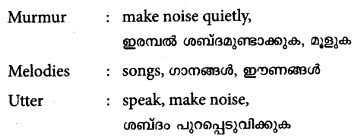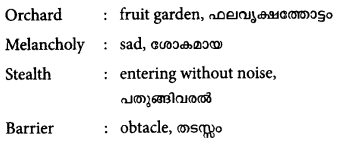Kerala Plus One English Textbook To Sleep Questions and Answers Unit 5 Chapter 2 (Poem)
Activity – I (Read and respond)
Question 1.
I’ve thought of all by turns what are the things that the poet thinks of?
Answer:
The things that the poet thinks of are a flock of sheep leisurely passing by one after one; the sound of rain, and bees murmuring; the fall of rivers, winds and seas, smooth fields, white sheets of water and pure sky.
Question 2.
Why couldn’t the poet sleep for three nights?
Answer:
The poet couldn’t sleep for three nights because sleep was running away from him.
Question 3.
Do you think that sleep embraced the poet in the end? Why?
Answer:
Yes, I think that sleep embraced the poet in the end because he entreated her not to run away and praised her with some fine words.
Question 4.
How many of you can identify with Wordsworth’s experience of lying awake until the ‘birds twitter their dawn chorus’?
Answer:
Many of us can identify with Wordsworth’s experience of being sleepless the whole night as they are stressed out by the pressures of life and so they cannot fall asleep until the birds twitter their dawn chorus.
Question 5.
How do you think the poet feels at the start of the poem?
Answer:
At the start of the poem the poet feels is a bit desperate and longs for sleep.
Question 6.
Pick out the images from the poem.
Answer:
The images from the poem are: A flock of sheep that leisurely pass by one after one, the falling rain, bees murmuring, the fall of rivers, white sheets of water and pure sky .smooth fields, twittering birds in the orchard and a mother bringing sweet things to her child.
Question 7.
Which lines or images do you think are the most effective in conveying the necessity of sound sleep?
Answer:
The last three lines are the most effective in conveying the necessity of sound sleep. Only if he sleeps the morning’s wealth will have any meaning for him. Sleep is the blessed barrier between day and day and she is the mother who brings fresh thoughts and joyous health.
Question 8.
The poem ends in a note of wistful hope and prayer. Do you agree? Why?
Answer:
Yes, I agree that the poem ends in a note of wistful hope and prayer. The poet is requesting sleep to come to him. She has been running away for three nights in succession. He hopes she will listen to his entreaty and come to him this night.
Question 9.
Comment on the length of the poem and the poetic form.
Answer:
The poem is a sonnet. A sonnet is a poem of 14 lines with a strict pattern of rhyme and rhythm. There are different forms of the sonnet but they share some common things which include: a key idea, its proper development and a conclusion with a twist. A sonnet is divided into 2 parts. The first 8 lines are called an octave and the last 6 lines are called a sestet. The poet has used several images in the poem which include a flock of sheep that leisurely pass by one after one, the falling rain, bees murmuring, the fall of rivers, white sheets of water and pure sky, smooth fields, twittering birds in the orchard and a mother bringing sweet things to her child. The rhyming scheme in this sonnet is abba, abba, edc, cdc.
Question 10.
The poet uses several images in the poem, like the sound of rain and the sight of the fields. Identify the images used buy the poet in ‘To Sleep’.
Answer:
- a flock of sheep passing by one after one
- bees murmuring
- white sheets of water
- pure sky
- birds singing from the orchard trees
- cuckoo’s melancholy cry
Study the various poetic devices given on page 147 of the text.
Activity – II (Critical Appreciation)
Question 1.
Based on the above discussions, prepare a critical appreciation of the poem bearing the tips given on page 147 and 148 of the text.
Answer:
The poem To sleep’ by William Wordsworth, who is known as the high priest of Nature, is an exquisite poem that presents to us some of the finest sights, sounds and movements of Nature. We can see a flock of sheep leisurely passing by one after one; we can the sound of rain and the murmuring of bees. We can hear the fall of rivers, winds and seas. We can see the smooth fields, white sheets of water and pure sky. We also hear the melodies of small birds coming from the orchard trees. We hear the cuckoo’s melancholy cry.
The poet can’t sleep. Maybe he is worried about the bad things happened during the past. In fact he has not slept for a couple of days and this makes him all the more worried. If he does not sleep he won’t be able to enjoy the wonderful sights and sounds of the morning. Sleep brings fresh thoughts and joyous health.
To Sleep’ is a sonnet. In the octave (first 8 lines), the poet describes the alluring sights and sounds of Nature. In the sestet (the last 6 lines) he describes his condition without sleep and requests sleep not to run away from him. He also talks about the blessings sleep brings. The rhyming scheme in the octave is abba, abba, and in the sestet it is cdc, cdc.
The poet has used personification effectively. Sleep is pictured as a mistress who is refusing to come to the poet. There is the Rhetorical Question “Without Thee what is all the mornings wealth?” There is onomatopoeia in ‘bees murmuring’. There is fine alliteration in ‘blessed barrier between’. There is hyperbole in calling sleep as the ‘Dear mother of fresh thoughts and joyous health’. On the whole To Sleep’ is an enjoyable poem with a fine message for all of us.
Question 2.
Wordsworth’s ‘To Sleep’tells us how important it is to have a sound sleep in order to remain mentally and physically fit. In this world where everything is ‘instant’ or instantly done, isn’t it important to avoid unhealthy habits? Discuss.
Answer:
In our modern world everything has become ‘instant’. We get instant coffee and tea, instant meals from the fast-food outlets, instant cures by quacks and even instant sleep through sleeping pills. People are in a hurry and they want everything instant. In the readymade stores you can get almost everything instant. If things go like this, the day is not far off when we can also get instant ‘babies’.
This desire for everything ‘instant’ is symptomatic of a disease that has gripped the modem society. People have lost the virtue of patience. Nobody is willing to wait for anything. This lack of patience makes us sick as it increases our blood pressure. We forget that ‘Haste makes waste’. By consuming all the ‘instant’ foods and clicks we are spoiling our health. The same thing happens when we resort to instant cures. There are instances where people wanted instant sleep. They swallowed many pills and they never got up from their sleep!
III. Read And Relfect
Walking, like any other exercise, undoubtedly leads to physical wellness. There may be differences of opinion. The argument that each and every moment has to be filled with activity has gained currency these days. Here in this essay, Max Beerbohm looks at walking from a different angle.
To Sleep (Poem) About the Author
William Wordsworth (1770-1850) was a major English Romantic poet. He had a deep love for nature which is depicted in many of his poems. He considered nature to be his friend, philosopher and guide. He became the Poet-Laureate in 1843 and remained so until he died in 1850.

To Sleep (Poem)Summary in English
Lines 1 – 8: I have thought of all these things by turns: a flock of sheep leisurely passing by one after one; the sound of rain, and bees murmuring; the fall of rivers, winds and seas, smooth fields, white sheets of water and pure sky. Still I lie sleepless. Soon I must hear the melodies of small birds, first uttered from my orchard trees, and the first cuckoo’s melancholy cry.
Lines 9 – 14: Last night it was like that. Two nights more I lay awake without winning sleep. Sleep, do not run away from me by using some tricks so that I don’t have to pass this night also without sleep. Without you the morning’s wealth is nothing. You are the barrier between day and day. You are the dear mother of fresh thoughts and joyous health.
To Sleep (Poem) Vocabulary

